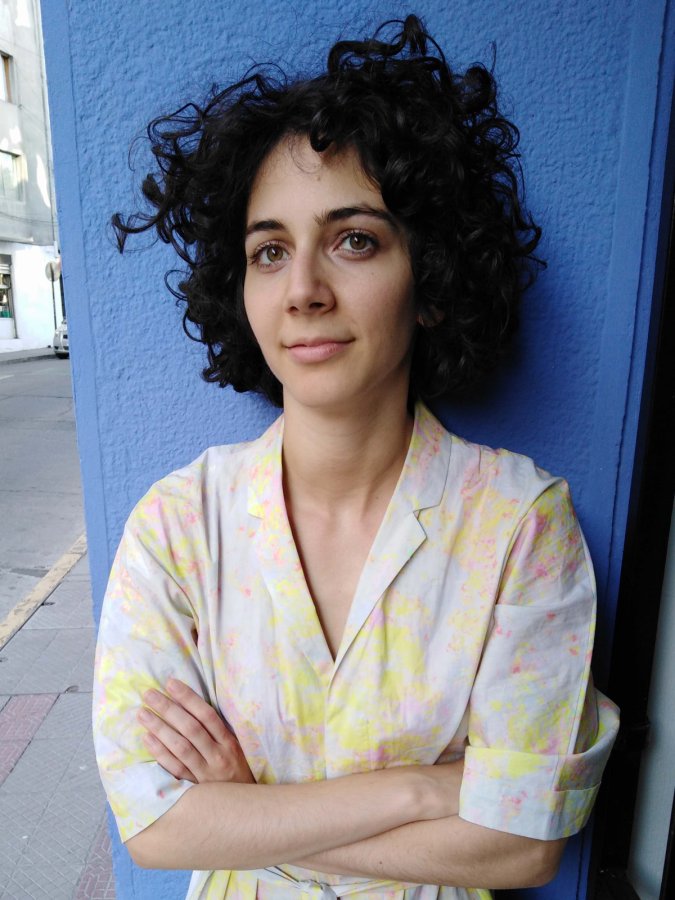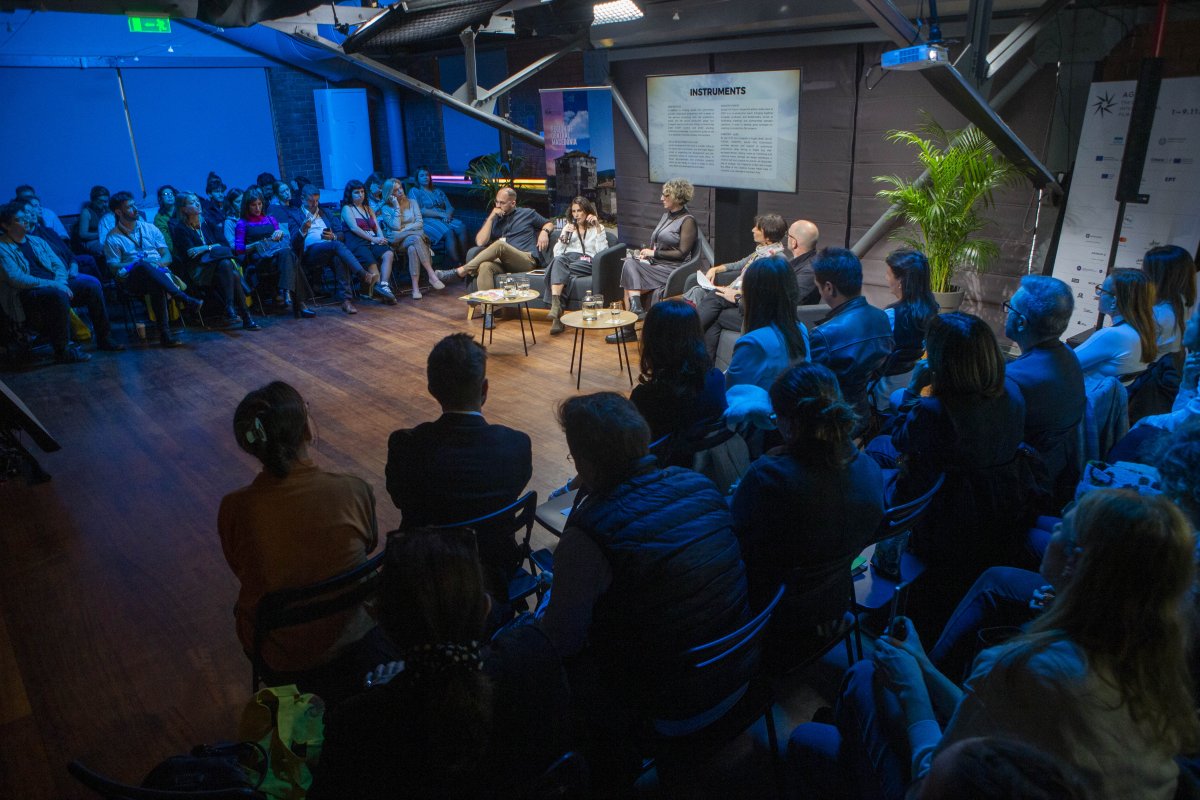PRESS CONFERENCE
As part of the 17th Thessaloniki Documentary Festival, the directors Heidi Specogna (Pepe Mujica - Lessons From The Flowerbed), Matthias von Gunten (ThuleTuvalu), Andre Andreev (Flame) and Stelios Efstathopoulos (Emery Tales) attended a press conference on Saturday March 21, 2015.
Stelios Efstathopoulos spoke first. His documentary Emery Tales, which he co-directed with Susanne Bausinger, was filmed in the mountainous landscape of Naxos, where six villages are permitted to mine emery, which is hidden in the subsoil of Μount Ammomaxi. The rock was once in demand, but isn’t any longer. Referring to the reasons why he decided to examine this subject, the director explained: “I have been working for German television as a cameraman since 1983. We have filmed many documentaries and Naxos has always been one of our favorite destinations. Talking with people on the island about emery, we decided that it would be an interesting subject. It’s a story unknown to most Greeks, even unknown to many people from Naxos. Asked how he thought the situation would play out for the miners, Efstathopoulos said: “It’s a very complicated story. I don’t think they could answer that question. They are entangled in this right and privilege, which is both a blessing and a curse. They are trapped in a situation which they can’t really deal with, while not even the government or private companies can intervene”. Regarding the antiquated and hazardous mining facilities on the island, the filmmaker said: “The circumstances are primitive. The last time the state invested money in the mine was in 1920. These people work in an extremely hazardous environment, and they don’t even make a profit. The only thing they pay for is there insurance. They work for four months a year just to guarantee their healthcare benefits. I hope the situation changes. People that live in Greece know this is very difficult. The villages have been abandoned. There’s nothing for young people to do there. They have a treasure on the island of Naxos, but it isn’t even enough to sustain the locals”.
In her film Pepe Mujica - Lessons from the Flowerbed, Heidi Specogna follows the former president of Uruguay, who is also known as the world’s poorest leader. An ex rebel and gardener, Pepe Mujica has become famous for his modest way of life, his unconventional behavior, when it comes to matters of protocol, and his political dreams. Specogna noted: “The first documentary I made about Mujica twenty years ago ends with him sadly wondering if he is capable of taking on a position in politics. He had just been released from prison and was wondering how much time he should be spending gardening. Twenty years later, I asked him what had happened to the dreamer inside. He told me hadn’t changed, but his environment had”. When asked what Mujica meant to her, the filmmaker said: “15 days ago we had elections in Uruguay and Mujica resigned from the presidency. By law he wasn’t allowed to run for a second consecutive term. And though in the film he told me that he wanted to abandon politics for good, a few days later he went to parliament and was voted in with the most votes. So, now he holds the second highest position in the hierarchy. If the president is away on a trip abroad, Mujica is in charge”. The director described her film’s hero as “a person that unifies a country that was divided for many years” and pointed out: “In Uruguay, during the military dictatorship many people were tortured. Every family has a victim. After the dictatorship we needed someone to unify the country’s citizens. Pepe doesn’t have feelings of hate. I don’t know what he does with them, but he definitely doesn’t express them. He isn’t interested in the past. All he’s interested in is finding solutions to his people’s problems”. As he says: “I am the president of all the citizens”.
Matthias von Gunten asks ecological and humane questions in his film ThuleTuvalu, where he connects two different corners of the planet that have become known due to climate change. Thule, Greenland has witnessed record ice melts and Tuvalu, a remote Pacific island nation, is one of the first countries on the verge of sinking as a result of rising sea levels. Talking about the reasons why he wanted to make this film, the director said: “I didn’t really want to make a film about climate change. I’m not an activist or a scientist. Everything began with these two places that were on my mind before climate change became an issue. I had found these two places on a map as a child because I liked to look at maps and “travel”. I would look for the scariest places you could live, look up where the coldest spot on the planet was, up north in Thule and read about Tuvalu, where, because of the different time zone, you could be standing on Friday with one foot and on Saturday with the other. With climate change, I began hearing those two names mentioned often. In my mind, I made up a word “thuletuvalu”, which sounded very melodic to me. Up north the ice caps melt, the sea level rises and it affects an island in the south. I remembered the chapter on communicating vessels from school physics. I also wanted to observe the situation, and how it is understood by the people that live there. Unfortunately, the typhoon which hit Vanuatu a few days ago also hit Tuvalu, so the situation there has already changed a lot and I don’t know what is happening there at the moment. What I do know is that there is a scarcity of drinking water, food and medicine”. While filming, the director observed how people deal with a long-term difficult situation. He noted: “You can’t wake up every day thinking you are living in a world without hope. So, you learn to become a bit indifferent. In my film, people try to ignore their problems and to get on with life, so they have a reason to get out of bed in the morning. What they are experiencing is a constant contradiction. I have no right to make them deal with a problem that they are trying to ignore”.
Andre Andreev, one half of directing duo Dress Code with Dan Covert, was also present to talk about their film Flame. The film takes us to early 2013. Bulgaria was engulfed by a big wave of demonstrations and protests for high electric and heating bills. The protests included a disturbing feature unknown to Bulgarian history: at least seven Bulgarian citizens set themselves on fire. One of them was Plamen Goranov, a 37-year-old construction worker and artist from the Black Sea city of Varna. Andreev explained: “My central hero, Plamen Goranov was one of thousands of people that participated in demonstrations. Seeing that the situation wasn’t changing, he decided to take matters into his own hands. He took part in a protest outside of the city hall building in his hometown holding a sign that said “If you don’t resign by this afternoon, I will set fire to myself”. In Varna, the mayor had been in power for 15 years. He managed to have a monopoly with people that created businesses with his permission. This drove everyone to despair, because they couldn’t see a way out”. Answering the question of whether or not anything changed, the directed said: “Three or four days later the mayor resigned. A national day of mourning was declared. The mayor mentioned Plamen as one of the reasons for his resignation. Of course, if you ask the citizens, they’ll tell you that the new mayor is as bad as the previous one. Essentially, nothing has changed. In Bulgaria there is a “myth” that nothing ever happens anyway, so why bother trying to change things?”















